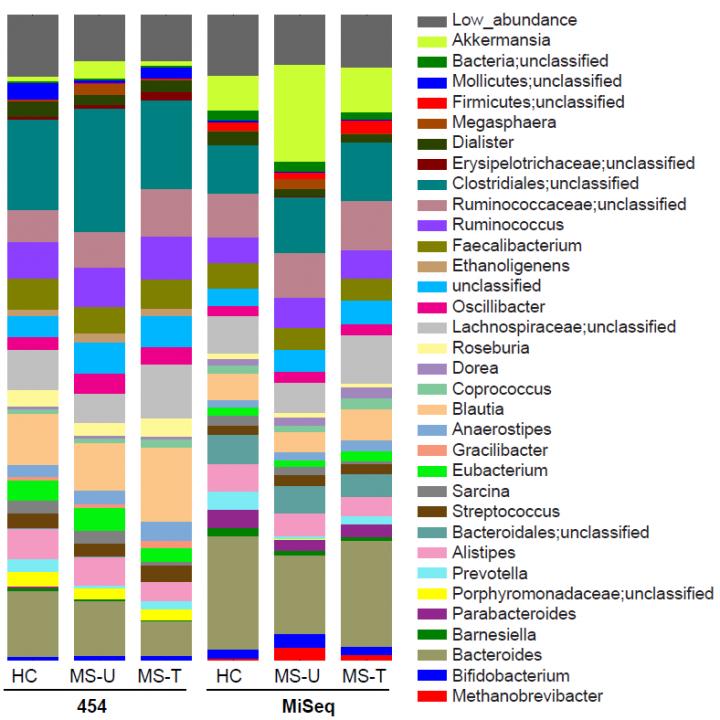Changes uncovered in the gut bacteria of patients with multiple sclerosis

Intestinal microbiome composition from healthy controls (HC), untreated MS patients (MS-U), and MS patients on disease modifying therapy (MS-Tr) measured on two different high-throughput DNA sequencing platforms, Roche 454 and Illumina MiSeq. Credit: Howard Weiner, Brigham and Women's Hospital
A connection between the bacteria living in the gut and immunological disorders such as multiple sclerosis have long been suspected, but for the first time, researchers have detected clear evidence of changes that tie the two together. Investigators from Brigham and Women's Hospital (BWH) have found that people with multiple sclerosis have different patterns of gut microorganisms than those of their healthy counterparts. In addition, patients receiving treatment for MS have different patterns than untreated patients. The new research supports recent studies linking immunological disorders to the gut microbiome and may have implications for pursuing new therapies for MS.
“Our findings raise the possibility that by affecting the gut microbiome, one could come up with treatments for MS – treatments that affect the microbiome, and, in turn, the immune response,” said Howard L. Weiner, MD, director of the Partners MS Center and co-director of the Ann Romney Center for Neurologic Disease at Brigham Women's Hospital, . “There are a number of ways that the microbiome could play a role in MS and this opens up a whole new world of looking at the disease in a way that it's never been looked at before.”
Weiner and colleagues conducted their investigations using data and samples from subjects who are part of the CLIMB (Comprehensive Longitudinal Investigation of Multiple Sclerosis) study at Brigham and Women's Hospital. The team analyzed stool samples from 60 people with MS and 43 control subjects, performing gene sequencing to detect differences in the microbial communities of the subjects.
Samples from MS patients contained higher levels of certain bacterial species – including Methanobrevibacter and Akkermansia – and lower levels of others – such as Butyricimonas – when compared to healthy samples. Other studies have found that several of these microorganisms may drive inflammation or are associated with autoimmunity. Importantly, the team also found that microbial changes in the gut correlated with changes in the activity of genes that play a role in the immune system. The team also collected breath samples from subjects, finding that, as a result of increased levels of Methanobrevibacter, patients with MS had higher levels of methane in their breath samples.
The researchers also investigated the gut microbe communities of untreated MS patients, finding that MS disease-modifying therapy appeared to normalize the gut microbiomes of MS patients. The researchers note that further study will be required to determine the exact role that these microbes may be playing in the progression of disease and whether or not modifying the microbiome may be helpful in treating MS. They plan to continue to explore the connection between the gut and the immune system in a larger group of patients and follow changes over time to better understand disease progression and interventions.
“This work provides a window into how the gut can affect the immune system which can then affect the brain,” said Weiner, who is also a professor of Neurology at Harvard Medical School. “Characterizing the gut microbiome in those with MS may provide new opportunities to diagnose MS and point us toward new interventions to help prevent disease development in those who are at risk.”
###
Funding support for this work included grants from the NIH/NINDS, The National Multiple Sclerosis Society and from The Harvard Digestive Disease Center.
Paper cited: Jangi S et al. “Alterations of the human gut microbiome in multiple sclerosis.” Nature Communications. DOI: 10.1038/NCOMMS12015
Brigham and Women's Hospital (BWH) is a 793-bed nonprofit teaching affiliate of Harvard Medical School and a founding member of Partners HealthCare. BWH has more than 4.2 million annual patient visits and nearly 46,000 inpatient stays, is the largest birthing center in Massachusetts and employs nearly 16,000 people. The Brigham's medical preeminence dates back to 1832, and today that rich history in clinical care is coupled with its national leadership in patient care, quality improvement and patient safety initiatives, and its dedication to research, innovation, community engagement and educating and training the next generation of health care professionals. Through investigation and discovery conducted at its Brigham Research Institute (BRI), BWH is an international leader in basic, clinical and translational research on human diseases, more than 3,000 researchers, including physician-investigators and renowned biomedical scientists and faculty supported by nearly $666 million in funding. For the last 25 years, BWH ranked second in research funding from the National Institutes of Health (NIH) among independent hospitals. BWH is also home to major landmark epidemiologic population studies, including the Nurses' and Physicians' Health Studies and the Women's Health Initiative as well as the TIMI Study Group, one of the premier cardiovascular clinical trials groups. For more information, resources and to follow us on social media, please visit BWH's online newsroom.
Media Contact
All latest news from the category: Health and Medicine
This subject area encompasses research and studies in the field of human medicine.
Among the wide-ranging list of topics covered here are anesthesiology, anatomy, surgery, human genetics, hygiene and environmental medicine, internal medicine, neurology, pharmacology, physiology, urology and dental medicine.
Newest articles

NASA: Mystery of life’s handedness deepens
The mystery of why life uses molecules with specific orientations has deepened with a NASA-funded discovery that RNA — a key molecule thought to have potentially held the instructions for…

What are the effects of historic lithium mining on water quality?
Study reveals low levels of common contaminants but high levels of other elements in waters associated with an abandoned lithium mine. Lithium ore and mining waste from a historic lithium…

Quantum-inspired design boosts efficiency of heat-to-electricity conversion
Rice engineers take unconventional route to improving thermophotovoltaic systems. Researchers at Rice University have found a new way to improve a key element of thermophotovoltaic (TPV) systems, which convert heat…



